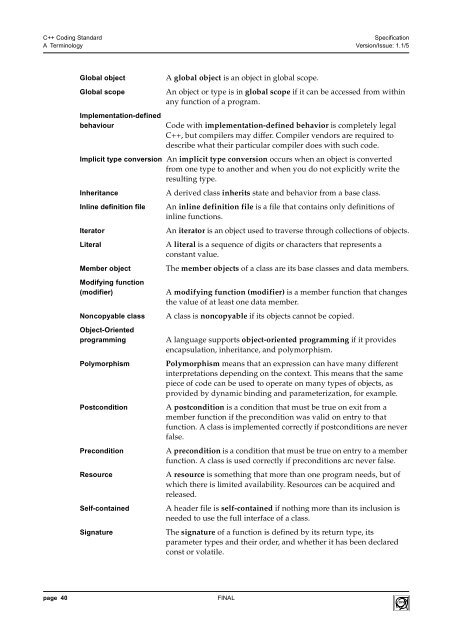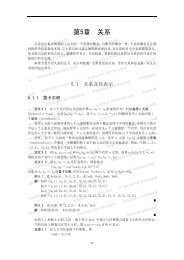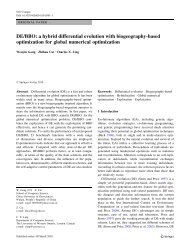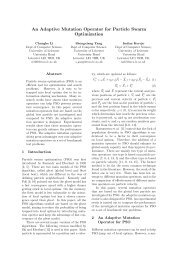C++ Coding Standard Specification - CERN
C++ Coding Standard Specification - CERN
C++ Coding Standard Specification - CERN
You also want an ePaper? Increase the reach of your titles
YUMPU automatically turns print PDFs into web optimized ePapers that Google loves.
<strong>C++</strong> <strong>Coding</strong> <strong>Standard</strong><br />
<strong>Specification</strong><br />
A Terminology Version/Issue: 1.1/5<br />
Global object<br />
Global scope<br />
Implementation-defined<br />
behaviour<br />
A global object is an object in global scope.<br />
An object or type is in global scope if it can be accessed from within<br />
any function of a program.<br />
Code with implementation-defined behavior is completely legal<br />
<strong>C++</strong>, but compilers may differ. Compiler vendors are required to<br />
describe what their particular compiler does with such code.<br />
Implicit type conversion An implicit type conversion occurs when an object is converted<br />
from one type to another and when you do not explicitly write the<br />
resulting type.<br />
Inheritance<br />
Inline definition file<br />
Iterator<br />
Literal<br />
Member object<br />
Modifying function<br />
(modifier)<br />
Noncopyable class<br />
Object-Oriented<br />
programming<br />
Polymorphism<br />
Postcondition<br />
Precondition<br />
Resource<br />
Self-contained<br />
Signature<br />
A derived class inherits state and behavior from a base class.<br />
An inline definition file is a file that contains only definitions of<br />
inline functions.<br />
An iterator is an object used to traverse through collections of objects.<br />
A literal is a sequence of digits or characters that represents a<br />
constant value.<br />
The member objects of a class are its base classes and data members.<br />
A modifying function (modifier) is a member function that changes<br />
the value of at least one data member.<br />
A class is noncopyable if its objects cannot be copied.<br />
A language supports object-oriented programming if it provides<br />
encapsulation, inheritance, and polymorphism.<br />
Polymorphism means that an expression can have many different<br />
interpretations depending on the context. This means that the same<br />
piece of code can be used to operate on many types of objects, as<br />
provided by dynamic binding and parameterization, for example.<br />
A postcondition is a condition that must be true on exit from a<br />
member function if the precondition was valid on entry to that<br />
function. A class is implemented correctly if postconditions are never<br />
false.<br />
A precondition is a condition that must be true on entry to a member<br />
function. A class is used correctly if preconditions arc never false.<br />
A resource is something that more than one program needs, but of<br />
which there is limited availability. Resources can be acquired and<br />
released.<br />
A header file is self-contained if nothing more than its inclusion is<br />
needed to use the full interface of a class.<br />
The signature of a function is defined by its return type, its<br />
parameter types and their order, and whether it has been declared<br />
const or volatile.<br />
page 40<br />
FINAL







